

Modelisation Financiere pour Entrepreneurs: Mediapart: business plan initial vs. business plan réalisé. Menace hyperlocale sur la presse locale. Livre, numérique, piratage (eBook, piracy) Content Farms 101: Why Suite101 Publishes 500 Articles a Day. When it comes to content farms, companies that churn out hundreds or thousands of new pieces of content every day, Demand Media has harvested most of the headlines over the past year.

But it's not the only company out there betting on quantity of content - others include Associated Content (acquired by Yahoo! In May), About.com (owned by the New York Times), Mahalo (founded by Jason Calacanis, who sold his previous business Weblogs, Inc. to AOL in 2005) and Answers.com. Suite101 is a relatively low profile site compared to the others mentioned above. Yet it produces 500 new pieces of content per day. Content farms v. curating farmers. Tweet: Content farms v curating farmers: Deeper insights in Demand Media’s model & finding opportunity in finding quality.

I spent an hour on the phone the other day with Steven Kydd, exec VP of Demand Studios, to understand their model—using algorithms to assign content creation based on search and advertising demand and to minimize cost and maximize revenue—because I wanted to learn a deeper layer of lessons than I think we’re hearing in the discussion of Demand’s allegedly evil genius. The talk thus far misses their key insight and the opportunities they create. Much of what I see online is fear that Demand Media—with the slightly rechristened “Aol.” following fast behind—will cheapen content and flood the internet—that is, search results—with crap that’s just good enough to fool algorithms. Some also fear that while putting content creators to work they will put better content creators out of work: the dreaded deprofessionalization and deflation of media.
They may be right.
How the web changed the economics of news - in all media. Listening to news executives talk about micropayments , Kindles , public subsidies , micropayments , collusion , blocking Google and anything else that might save their businesses, it occurs to me that they may have missed some developments in, ah, well, the past ten years.
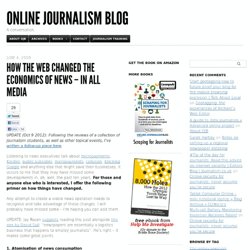
Any attempt to create a viable news operation needs to recognise and take advantage of these changes. I will probably have missed some – I’m hoping you can add them. UPDATE: Jay Rosen suggests reading this post alongside this one by David Sull : “newspapers are essentially a logistics business that happens to employ journalists”. He’s right – it makes some great points. In the physical world news came as a generic package. Le iTunes de l’info débarque - Web 1,2,3 - ElectronLibre. Business.view: The year of the paywall. « On gère le déclin.... » Newsmap. From Distribution To The Link Economy (by @baekdal) #publishing. Admit all the changes faced by news organizations, like the lack of monopoly, real-time reporting, creating original content, and the disappearance of print, there seems to be one element that most news people still do not understand.
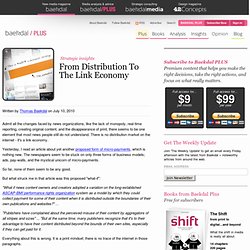
There is no distribution market on the internet - it's a link economy. Yesterday, I read an article about yet another proposed form of micro-payments, which is nothing new. The newspapers seem to be stuck on only three forms of business models; ads, pay-walls, and the mystical unicorn of micro-payments. So far, none of them seem to be any good. Fred Wilson at 140 Conference sur Flickr : partage de photos ! The Digital Magazine: Has its Time Come? We all love to flip through a glossy, interesting magazine on the plane, in the dentist's waiting room, or stretched out on the sofa in the evening.
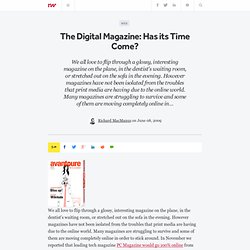
However magazines have not been isolated from the troubles that print media are having due to the online world. Many magazines are struggling to survive and some of them are moving completely online in order to stick around. In November we reported that leading tech magazine PC Magazine would go 100% online from February 2009, after 27 years of existing in print form. Tentatives d’intelligence collective et de reseaux ouverts » Tec. Social Media Club : Nouveaux métiers du journalisme – le compte. La session publique s’est déroulée le 17 février 2010, à La Cantine.
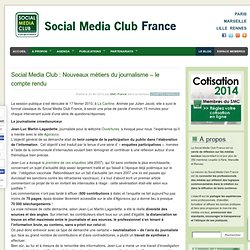
Animée par Julien Jacob, elle a suivi le format classique du Social Media Club France, à savoir une prise de parole d’environ 15 minutes pour chaque intervenant suivie d’une série de questions/réponses. Le journalisme crowdsourceur Jean-Luc Martin-Lagardette, journaliste pour le webzine Ouvertures, a évoqué pour nous l’expérience qu’il a menée avec le site Agoravox. News is a lousy business for Google too cdixon.org – chris dixon. There is a widespread myth that search engines have taken profits away from news websites.
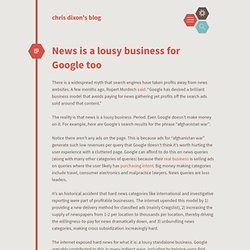
A few months ago, Rupert Murdoch said: “Google has devised a brilliant business model that avoids paying for news gathering yet profits off the search ads sold around that content.” The reality is that news is a lousy business. Period.